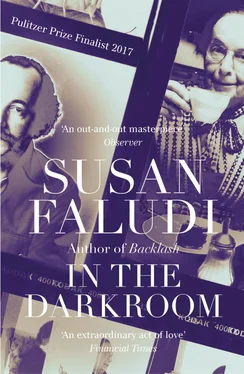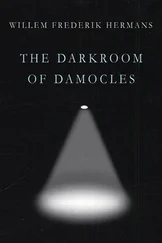Feminism, according to the insistent mantra, is all about “choice.” Did I choose to be a feminist? Wasn’t it also what I inherited, what I made out of a childhood history I couldn’t control? I became an agitator for women’s equality in response to my father’s fury over his own crumbling sense of himself as a man in command of his wife and children. My identity as a feminist sprang from the wreckage of my father’s “identity crisis,” from his desperation to assert the masculine persona he had chosen. Feminism, as an avocation and a refuge, became the part of my life that I chose. The part I couldn’t escape was my father.
The term “identity” is a hall of mirrors, “as unfathomable as it is all-pervasive,” Erik Erikson asserted in 1968. He had coined the term (shortly before he coined the phrase “identity crisis”). But on the first page of his weighty tome on the subject, Identity: Youth and Crisis , he confessed he couldn’t define it. The best he could hazard was that “a sense” of identity felt like a “subjective sense of an invigorating sameness and continuity.”
A crisis seemed inevitable, given the murkiness of personal identity evident in subsequent definitions, like the one in the Oxford English Dictionary: “The fact that a person or thing is itself and not something else.” Over the years, attempts to come up with “identity theory” have foundered. In 1967, sociologist Nathan Leites bemoaned (as recounted by UCLA colleague and transsexual-treatment pioneer Robert Stoller), “The term identity has little use other than as fancy dress in which to disguise vagueness, ambiguity, tautologies, lack of clinical data, and poverty of explanation.” Mass popularization didn’t help. In a 1983 essay titled “Identifying Identity,” historian Philip Gleason observed: “As identity became more and more a cliché, its meaning grew progressively more diffuse, thereby encouraging increasingly loose and irresponsible usage. The depressing result is that a good deal of what passes for discussion of identity is little more than portentous incoherence.” And yet, for all its ambiguity, the question of identity would define and transfix Erikson’s age, and ours.
Identity as a concept didn’t enter psychological theory until after World War II. When Erikson searched for antecedents in the utterances of his professional forebears, he found that Sigmund Freud invoked the term seriously only once, in an address to the Society of B’nai B’rith in Vienna in 1926. The founding father of psychoanalysis was describing what made him Jewish: “neither faith nor national pride,” Freud confessed, but “many obscure emotional forces, which were the more powerful the less they could be expressed in words, as well as a clear consciousness of inner identity.” In short, he felt like a Jew but couldn’t say why.
Early on, Erikson counseled against the urge to define individual identity as something you acquire and display all by yourself. “Mere ‘roles’ played interchangeably, mere self-conscious ‘appearances,’ or mere strenuous ‘postures,’” he wrote, are not “the real thing,” although they are some of the prominent elements of “the ‘search for identity.’” A sturdier selfhood, he maintained, emerges from the interplay between self-development and a collective inheritance. “We cannot separate personal growth and communal change,” he wrote, “nor can we separate … the identity crisis in individual life and contemporary crises in historical development because the two help to define each other and are truly relative to each other.”
Just as it is impossible to separate your individual identity from your social identity, Erikson held, so is it necessary to synthesize your past with your present, to incorporate all aspects of your experience, even (or especially) the parts you prefer not to acknowledge. When someone tries to deny unwanted history, “the diverse and conflicting stages and aspects of life,” and insists instead on a “category-to-be-made-absolute,” Erikson cautioned, “he restructures himself and the world by taking recourse to what we may call totalism ,” an inner tyranny in which an internal despot patrols “an absolute boundary,” maintaining it regardless of whether the new identity is organic or its components coherent.
Erikson famously failed to heed his own warning. In a 1975 article titled “Erik Erikson, the Man Who Invented Himself,” philosopher Marshall Berman, Erikson’s former graduate student, detected a disturbing absence in his mentor’s autobiographical writings: Erikson had scrubbed his past. The erasure began with the family name, Homburger, which he had first reduced to a middle initial, “H.,” then eliminated altogether. The deletion suggested to Berman a more disturbing equivocation:
As we unravel [Erikson’s] story, we discover something else he cannot bear to say: that he is a Jew. We infer that his mother, “nee Karla Abrahamsen,” was Jewish, and we read that his stepfather, Dr. Theodor Homburger, was not only a Jew, but a member of a synagogue. However, Erikson says of himself that as a child he didn’t look Jewish: blond and blue-eyed and “flagrantly tall,” he was jokingly “referred to as ‘goy’ in my stepfather’s temple.”
As an adult, Erikson reinforced that goyishness (along with marrying an Episcopalian minister’s daughter and displaying a crucifix on the wall of his Harvard study) by adopting a new and invented last name, one that implied not only gentile origins but self-genesis. “I made myself Erik’s son,” he told a friend. “It is better to be your own originator.”
Better, that is, if you succeeded in shucking your provenance. Had he? In a long letter to a social worker who had asked him to describe his religious faith, Erikson wrote, “I know that nobody who has grown up in a Jewish environment can ever be not-a-Jew, whether the Jewishness he experienced was defined by his family’s sense of history, by its religious observances, or, indeed, by the environment’s attitudes toward Jews.”
In Identity: Youth and Crisis , Erikson described a patient, a “tall, intelligent ranch owner” who had concealed his religious origins from everyone but his wife. Despite an outwardly successful life, he was plagued by “a network of compulsions and phobias” that derived from his childhood as an urban Jew. “His friends and adversaries, his elders and his inferiors all unknowingly played the roles of the German boys or the Irish gangs who had made the little Jewish boy miserable on his daily walk to school,” Erikson wrote. “This man’s analysis provided a sad commentary on the fact that [Nazi publisher Julius] Streicher’s presentation of an evil Jewish identity is no worse than that harbored by many a Jew,” even a Jew living as far from his collective past as the American West. “The patient in question sincerely felt that the only true savior for the Jews would be a plastic surgeon.”
Whenever as a child I’d press my father on his Jewish heritage, and its banishment from our suburban home, he would dismiss my questions with a vaguely regal wave of the hand and a look of withering condescension. “That’s not interesting,” he’d say. Or, one of his trademark conversation-enders, “A stupid thing .” Later, on my first visit to my father in Hungary, I’d ask why she’d changed the family name. In 1946, the Friedmans became the Faludis. It was eighteen-year-old István’s idea. My father chose Faludi, she told me, for two reasons: it was an old Magyar name, meaning “of the village” (true Magyars hail from the countryside), and she’d seen it roll by on the credits of so many Hungarian films she’d adored as a boy (“Processed by Kovács & Faludi”).
Had she also shed the name Friedman, I asked, because it sounded Jewish? My question prompted her usual gesture.
Читать дальше












